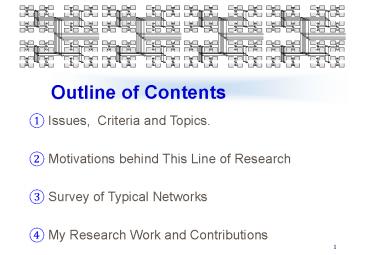Outline of Contents PowerPoint PPT Presentation
1 / 54
Title: Outline of Contents
1
Outline of Contents
- ? Issues, Criteria and Topics.
- ? Motivations behind This Line of Research
- ? Survey of Typical Networks
- ? My Research Work and Contributions
2
? Issues / Criteria / Topics
- Topology and Analysis
- Routing and Communication
- Mapping and Simulation
- Algorithm and Computation
- VLSI Design and Construction
3
? Issues / Criteria / Topics
- Topology and Analysis
- degree,diameter,average distance, bisection
bandwidth,connectivity,symmetry,recursiveness,
scalability,Hamiltonian path - Routing and Communication
- Mapping and Simulation
- Algorithm and Computation
- VLSI Design and Construction
4
? Issues / Criteria / Topics
- Topology and Analysis
- Routing and Communication
- Pattern routing,broadcasting,multicasting,gossip
- EvaluationEasy routing,deadlock-free,delay,traffi
c density, - Control Strategy centralized/distributed,
deterministic/adaptive,minimal/non-minimal, - Switching circuit/packet, wormhole, virtual
cut-through - Mapping and Simulation
- Algorithm and Computation
- VLSI Design and Construction
5
? Issues / Criteria / Topics
- Topology and Analysis
- Routing and Communication
- Mapping and Simulation
- To compare the computing power
- G H
- Smallest possible dilation and congestion
- Algorithm and Computation
- VLSI Design and Construction
embedding
6
? Issues / Criteria / Topics
How to embed a ring into a line
1
2
8
3
7
4
6
5
1
2
3
4
5
6
7
8
Dilation7, congestion2
1
2
3
4
5
6
7
8
8
7
6
5
1
2
3
4
Dilation2, congestion2
7
? Issues / Criteria / Topics
- Topology and Analysis
- Routing and Communication
- Mapping and Simulation
- Algorithm and Computation
- PRAM model is unpractical.
- Basic algorithms sorting,searching,permutation,ma
trix multiplication,bit reversal, graph
algorithm,iteration method,symbolic computing. - VLSI Design and Construction
8
? Issues / Criteria / Topics
- Topology and Analysis
- Routing and Communication
- Mapping and Simulation
- Algorithm and Computation
- VLSI Design and Construction
- Wafer-scale integration
- Layout design area and wire length,wire
area,crossing number,node cost and modularity - Applicable to the board design
9
? Motivations
- A branch of combinatorics
- Structures for building multiprocessor and
multicomputer - More than structural
- ASICimplementing special parallel algorithm on
VLSI/Wafer scale. - P2P overlay topologies
- Data Center Networking
- SoC or NoC for Many-core
10
? Big Names
- F. Thomson Leighton (Theory) http//theory.lcs.mit
.edu/ftl/ - Lionel M. Ni (wormhole) http//www.cps.msu.edu/ni
/ - Arnold L. Rosenberg (Butterfly)
http//www.cs.umass.edu/rsnbrg/ - Burkhard Monien (Embedding) http//www.uni-paderbo
rn.de/fachbereich/AG/monien/ - Laxmi N. Bhuyan (Multi-stage) http//www.cs.tamu.e
du/faculty/bhuyan/ - Kenneth E. Batcher (Bitonic) http//nimitz.mcs.ken
t.edu/batcher/index.html - Ivan Stojmenovic (Honeycomb) http//www.csi.uottaw
a.ca/ivan/ - Ke Qiu (Star and Pancake) http//dragon.acadiau.ca
/kqiu/home.html - Wei Zhao (Routing) http//www.cs.tamu.edu/faculty/
zhao/ - S. Lennart Johnsson (Hypercube)
http//www.cs.uh.edu/johnsson/ - Satoshi Fujita(gossip) http//www.se.hiroshima-u.a
c.jp/fujita/ - William J. Dally (k-ary n-cube)
http//www.ai.mit.edu/people/billd/ - S. Yalamanchili (Engineering ct)
http//users.ece.gatech.edu/sudha/ - C.E. Leiserson (Parallel Algorithms)
http//supertech.lcs.mit.edu/cel/ - Kai Hwang (Benchmarking) http//ceng.usc.edu/kaih
wang/
11
? A Special Journal on Interconnection Networks
Among the editorial board
D Frank Hsu (Fordham University) Bruce M Maggs
(Carnegie Mellon )Jean-Claude Bermond
(CNRS/INRIA/UNSA)Tse-Yun Feng (Penn State
University)Yoji Kajitani (Tokyo Institute of
Tech)F Tom Leighton (MIT)Guo-Jie Li (Chinese
Academy of Sciences)Burkhard Monien (University
of Paderborn)Howard Jay Siegel (Purdue
University)Tom Stern (Columbia University)
Website http//journals.worldscinet.com/join
12
? Survey of Network Topology
- The following discussion of the properties of
interconnection networks is based on a collection
of nodes that communicate via links. In an actual
system the nodes can be either processors,
memories, or switches. Two nodes are neighbors if
there is a link connecting them.
13
? Network Parameters
- Channel width
- Number of wires that are used per channel (i.e.
the number of bits that can be transmitted
simultaneously on one channel). - Channel direction
- The direction in which the messages can be
transmitted. - Unidirectional can send messages in just one
direction - Bi-directional support two-way communication
over the same channel. - Bisectional width (BW)
- It is defined as the number of channels that are
cut when the network is divided into two equal
parts.
14
? Network Parameters
- Node degree (?)
- Number of channels connecting a node to its
neighbors. - In practice the degree of a topology has an
effect on cost, since the more links a node has
the more logic it takes to implement the
connections. - Network diameter (D)
- Maximum distance between any two nodes in the
network. - Cost Effectiveness ? x D,
- Problem of Dense graph Given the fixed degree
and diameter, how to design a graph which can
contain as many nodes as possible? - Average distance
15
? Network Parameters
- Number of links (l)
- The total number of channels in the network.
- Symmetry
- A network is said to be symmetric if it looks the
same from every node. (E.g. Hypercube, crossbar) - Recursiveness
- A large-size network consists of two or many
small-size networks of the same kind, such as
tree and hypercube. This property renders the
network suitable for solving divide-and-conquer
algorithm
16
? Crossbar switch
P0

